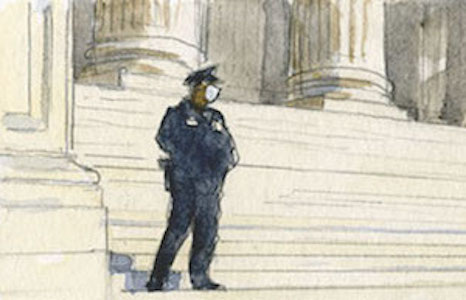Thursday round-up

Amy Howe reports for this blog, in a post that first appeared at Howe on the Court, that “[a]fter just under three years (and three Supreme Court terms) on the job, Noel Francisco announced today that he would step down as the solicitor general of the United States, effective July 3, 2020.” According to Jessica Gresko at AP, “[i]t is common for people in the job to leave in the summer, when the Supreme Court takes a break, before a presidential election.” For The Washington Post (subscription required), Robert Barnes reports that “Francisco, 50, who was confirmed in September 2017, has defended some of the administration’s most controversial cases at the Supreme Court, most notably Trump’s ban on travelers from certain mostly Muslim countries.”
Meghan Droste analyzes Monday’s opinion in Bostock v. Clayton County, Georgia, in which the court held that federal employment discrimination law protects gay and transgender employees, at Subscript Law. For the Los Angeles Times, David Savage reports that the decision, written by Justice Neil Gorsuch, President Donald Trump’s choice to replace the late Justice Antonin Scalia, “sent a shudder through the ranks of conservative activists and columnists, some of whom saw signs of another betrayal by a Republican-appointed justice who ended up siding at times with liberals on key issues”; “despite the hand-wringing over this week’s ruling, there is little evidence that Gorsuch will become a moderate or a swing vote.” Adam Pankratz and Natalie Turner discuss the decision at Ogletree Deakins, as does Brett Milano at The Harvard Gazette.
At the Human Rights at Home blog, John Rice greets the decision “with cautious optimism,” noting that “[m]uch should, can, and will be written about the ‘next’ issues arising and the inherent limits of the moment.” At Justia’s Verdict blog, Lesie Griffin points out that “some religions think they may discriminate against LGBTQs as a right of religious freedom,” and that the court will hear a case next term that raises just such a claim — Fulton v. Philadelphia, a challenge to Philadelphia’s exclusion of Catholic Social Services from the city’s foster care system because the group will not place children with same-sex couples. In an op-ed at Bloomberg, Cass Sunstein points out that “[i]f the text of Title VII condemns discrimination on the basis of sexual orientation, it might well be taken to condemn affirmative action as well.”
At PrawfsBlawg, Kerri Stone writes that “[t]his opinion enshrines in the law what had already been called for, derived and intuited by jurists, scholars, and advocates nationally for decades.” In an op-ed for the Detroit Free Press, Michael Farris asserts that “[i]t is categorically unfair for a law to be passed and then, 56 years later, watch six judges determine that 535 elected members of Congress used words that had meanings no one recognized at the time.” Jessica Prol Smith writes at The Federalist that “Monday’s decision muddles our consensus about human identity and our shared understanding of language.” In an op-ed for The New York Times, Linda Greenhouse examines “the sharply contrasting vantage points from which the majority and [Justice Samuel Alito’s] dissent … viewed the issue, whether from the past, present or future.” [Disclosure: Goldstein & Russell, P.C., whose attorneys contribute to this blog in various capacities, is counsel on an amicus brief in support of respondent Stephens in Harris Funeral Homes v. EEOC, which was decided along with Bostock.]
Briefly:
- In an op-ed for The New York Times, Stephen Vladeck writes that “for all of the attention that we pay to the[] ‘merits’ cases on the court’s docket, the Trump administration, with a majority of the justices’ acquiescence, has quietly racked up a series of less visible — but no less important — victories by repeatedly seeking (and often obtaining) stays of lower-court losses,” “allowing challenged government programs to go into full effect even though lower courts have struck them down — and often when no court has ever held them to be lawful in the first place.”
- At Reason, Zac Morgan and Luke Wachob urge the justices to review McKesson v. Doe and reverse a lower court decision that allowed a policeman who was injured by an unknown attacker at a Black Lives Matter protest to sue the protest’s organizer; they argue that “the Fifth Circuit’s opinion handed a terrible weapon to would-be censors.”
- Ilya Shapiro argues at the Cato Institute’s Cato at Liberty blog that with its “decision to deny all pending petitions raising Second Amendment issues, … the Supreme Court has abdicated its responsibility to say what the law is in this important and contentious area.”
- In an op-ed at the Washington Examiner, Rep. Greg Walden and others urge the court to review Baley v. United States, which “centers on the federal government taking water developed and stored solely for irrigation uses authorized through the 1905 Klamath Project,” and “to protect the private property rights of farmers and ranchers in the Western states.”
- This blog‘s analysis of Monday’s opinion in U.S. Forest Service v. Cowpasture River Preservation Association, in which the court held that the Forest Service had the authority to grant a right of way for a natural gas pipeline through lands traversed by the Appalachian Trail, comes from Noah Sachs. [Disclosure: Goldstein & Russell, P.C., whose attorneys contribute to this blog in various capacities, is counsel on an amicus brief in support of the respondents in this case.]
We rely on our readers to send us links for our round-up. If you have or know of a recent (published in the last two or three days) article, post, podcast or op-ed relating to the Supreme Court that you’d like us to consider for inclusion in the round-up, please send it to roundup [at] scotusblog.com. Thank you!
Posted in Round-up
